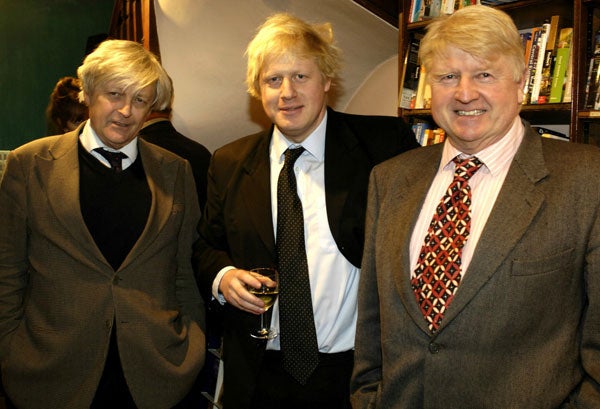Best Seat in the House, By Frank Johnson Edited by Virginia Fraser

Your support helps us to tell the story
From reproductive rights to climate change to Big Tech, The Independent is on the ground when the story is developing. Whether it's investigating the financials of Elon Musk's pro-Trump PAC or producing our latest documentary, 'The A Word', which shines a light on the American women fighting for reproductive rights, we know how important it is to parse out the facts from the messaging.
At such a critical moment in US history, we need reporters on the ground. Your donation allows us to keep sending journalists to speak to both sides of the story.
The Independent is trusted by Americans across the entire political spectrum. And unlike many other quality news outlets, we choose not to lock Americans out of our reporting and analysis with paywalls. We believe quality journalism should be available to everyone, paid for by those who can afford it.
Your support makes all the difference.How, one wonders, would Frank Johnson have reviewed this book of his collected columns? His style is infectious, but very much his own, and other political satirists, essayists and commentators who have tried to imitate him over the past 30-odd years have never come close.
He might have begun something like this: "A rumour spread through Westminster that the lengthy career of Frank Johnson, perhaps best known as the best political sketch writer and observer of parliamentary foibles, came to an end three years ago. But I have evidence to disprove this preposterous theory. Johnson is immortal, and here is a collection of his published pieces which prove beyond doubt that he will provide insight, knowledge and above all much amusement to generations as yet unborn."
Johnson, the most modest and likeable of men, would never have flattered himself, but the above is true nonetheless. Frank's widow Virginia Fraser undertook the immense task of selecting the most memorable of a long, long line of memorable pieces, skilfully linking them with a brief commentary to give us (or new readers we old fans of Frank's well remember his work, although not as well as his victims) context and setting. Very cleverly, she has also got the lampooned to recall how they felt, which seems to be privilege at being singled out. They didn't necessarily feel that at the time.
Frank Johnson's satires still make the reader laugh just as they did when they first appeared in the Daily Telegraph in the 1970s, and later in The Times and the Spectator, where he was editor for four years.
But, as with all good satire, there was always a serious point. Frank was remarkably politically aware and perceptive, and these essays provide an invaluable snapshot of parliamentary life, particularly in the Thatcher era which was probably his heyday.
Frank's great trick (or one of them) was that, although he caused his victim to writhe in discomfort, he was never vicious or nasty. The person he lampooned so brilliantly in the morning would often become his drinking partner in the evening. The joke was on you if you took offence. After a Johnson sketch, all the world seemed to be laughing at you, so you might as well join in.
Some of the best phrases of the day were coined by Frank. Margaret Thatcher, in her first appearance as the Opposition's finance and public expenditure spokesman in November 1974, "proved, as was once said of a deceptively easy-going operatic prima donna, that she has dimples of iron". This was the origin of the Iron Lady, which Enoch Powell later picked up after the Falklands invasion, in his portentous gloom-laden way: "the nation and the prime minister herself will learn of what metal she is made".
After the war was won, he acknowledged it was "ferrous matter of the highest quality". Under Frank's hand, Norman Tebbit became the Chingford Strangler and Dennis Skinner the Beast of Bolsover.
Johnson's prose is so polished and interwoven with classical and opera references that it is almost impossible to believe that he failed his 11-plus and left school at 15 with one O-level. Far from disguising his roots, he often referred to them, always fondly and sometimes hilariously as on the famous occasion when, aged 14, he appeared on the stage at Covent Garden with Maria Callas in Bellini's Norma as one of the two children the heroine had decided to stab to death. Frank found himself clasped to the famous bosom, right nipple stuck into his right eye, "which partnership remained throughout the subsequent duet".
He came a long way, from tea boy on the Sunday Express to writer of mini-masterpieces for the great newspapers of the day. One hopes that future generations will appreciate him as much as we have.
Join our commenting forum
Join thought-provoking conversations, follow other Independent readers and see their replies
Comments